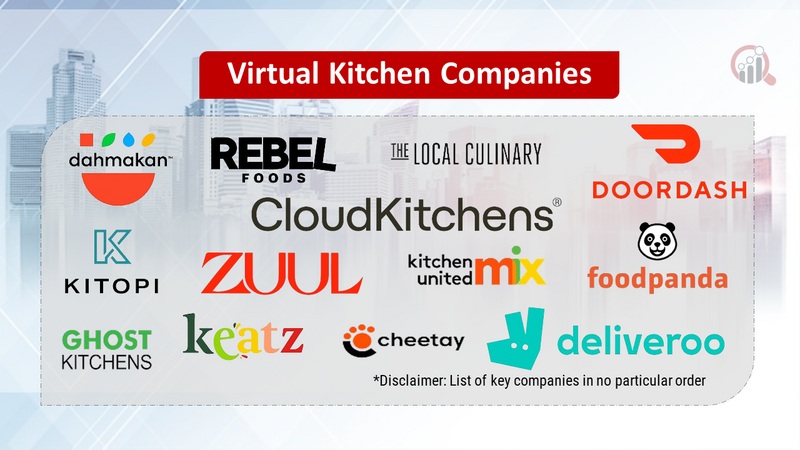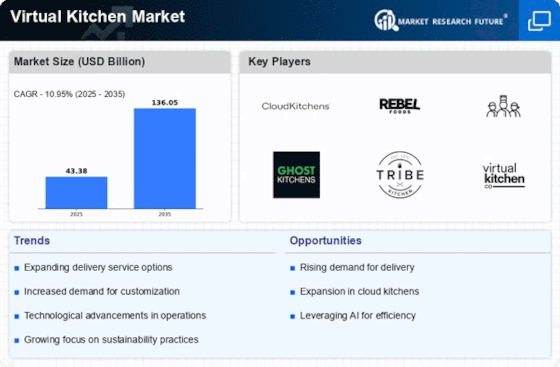Top Industry Leaders in the Virtual Kitchen Market

Navigating the Culinary Maze: A Deep Dive into the Competitive Landscape of the Virtual Kitchen Market
The virtual kitchen market, encompassing restaurants operating without dine-in spaces and focusing solely on delivery and takeout, is experiencing explosive growth, projected to reach a staggering value by 2030. This rapid ascent attracts diverse players, all vying for a slice of this lucrative pie. Let's navigate the complex culinary maze and understand the forces shaping this dynamic ecosystem.
Key Players:
- Kitchen United
- Rebel Foods
- Keatz
- Zuul Kitchens
- Kitopi
- CloudKitchens
- Dahmakan
- Swiggy Access
- Foodpanda Virtual Kitchen
- Taster
- Cheetay
- The Local Culinary
- Smart City Kitchens
- Ghost Kitchen Brands
- DoorDash Kitchens
- Deliveroo Editions
- Editions by Uber Eats
- Deliverect
- Deliveroo Editions
Strategies for Success:
-
Concept and Menu Optimization: Virtual kitchens thrive on distinct, delivery-friendly menus optimized for specific food trends and dietary preferences. Streamlining operations and packaging for travel are crucial.
-
Technology and Data Leverage: Utilizing data analytics to understand customer preferences, optimize menus, and personalize marketing campaigns is key for effective targeting and driving repeat orders.
-
Delivery Partnerships and Optimization: Efficient partnerships with delivery aggregators and optimizing delivery logistics for speed and quality are essential for customer satisfaction and brand reputation.
-
Marketing and Brand Building: Building brand awareness through targeted digital marketing and social media engagement is crucial for creating a distinct identity in a crowded virtual marketplace.
Factors for Market Share Analysis:
-
Target Market & Location: Focusing on specific demographics, dietary preferences, and geographical areas allows for strategic menu development and targeted marketing campaigns.
-
Operational Efficiency and Cost Control: Managing overhead costs through shared kitchen spaces, streamlined operations, and efficient waste management is crucial for profitability.
-
Quality and Food Safety: Maintaining high food quality and rigorous hygiene standards throughout the preparation and delivery process is vital for brand trust and customer retention.
-
Technology Integration and Automation: Adopting technology solutions for order management, kitchen operations, and delivery tracking minimizes errors and improves efficiency.
New and Emerging Companies:
The influx of innovative concepts keeps the virtual kitchen market vibrant. Some intriguing examples include:
-
Zuul: Focusing on high-quality, chef-driven virtual brands across diverse cuisines, catering to premium delivery options.
-
CaliBurger: Offering customized burger experiences through virtual kitchens, allowing customers to build their perfect burger online for delivery.
-
Robot Chefs: Companies like Chowbotics and Miso Robotics are developing automated kitchen solutions like robotic pizza chefs, potentially disrupting the future of virtual kitchen operations.
Current Investment Trends:
Investment in the virtual kitchen market is robust, with both established players and venture capitalists pouring in funds. Key areas of focus include:
-
Cloud Kitchen Infrastructure: Expanding shared kitchen facilities and developing efficient operational models to cater to the growing demand for virtual kitchen spaces.
-
Delivery Logistics and Automation: Streamlining delivery processes through intelligent routing, automated delivery robots, and partnerships with drone delivery companies.
-
Food Science and Technology: Investing in innovations like plant-based protein alternatives, shelf-stable meals, and packaging solutions for optimized delivery.
-
Data Analytics and AI Integration: Leveraging data and AI for menu optimization, demand forecasting, and personalized customer experiences.
Latest Company Updates:
-
Dec 27, 2023: TechCrunch: Rise of ghost kitchen platforms like Kitchen United and Reef Kitchens facilitating virtual kitchen operations and delivery logistics. -
Jan 2, 2024: Forbes: AI-powered food ordering and menu optimization becoming crucial for virtual kitchens to personalize offerings and improve efficiency. -
Dec 30, 2023: VentureBeat: Venture capital investment in virtual kitchen startups surges, with companies like CloudKitchens and Kitchen Hub securing millions in funding.











